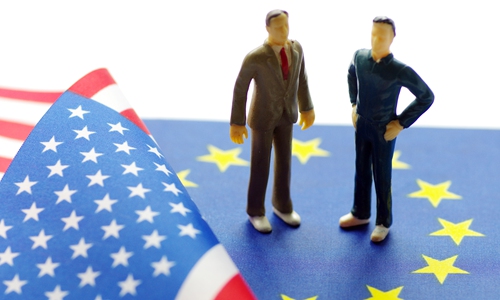Western public opinions not unified on China regarding pandemic
By Wang Yiwei Source:Global Times Published: 2020/5/12 18:20:38

Photo: IC
European public opinion about China has gone through three stages since the outbreak of the COVID-19.
First, during the early outbreak in China, some European politicians and media outlets were satirizing and smearing China. The German weekly news magazine Der Spiegel reported that the novel coronavirus was "made in China" in its cover story.
Second, when the virus hit Europe, it began seeking help from China while remaining vigilant against China. In the third stage, after the outbreak was declared a pandemic, Europe started to reflect on its relations with China, as well as on globalization.
European public opinion about China regarding the ongoing pandemic has the following prominent characteristics. The continent is still on alert for China's 5G technology and China-proposed Belt and Road Initiative (BRI).
For instance, some members of the European Parliament questioned whether China's aid to Italy and the Eastern European countries has anything to do with the promotion of the BRI. They harbor suspicion that China sent masks to the Netherlands as a ploy to draw the latter over to its side and to encourage the Netherlands not to implement bans on China's tech giant Huawei from providing 5G technology.
In spite of this, Europe pays more attention to its own internal affairs. This is markedly different from what the US has been doing. Most European scholars are now focusing on specific epidemic issues within the European Union (EU), including EU solidarity against the virus and measures needed for further integration within the bloc.
Moreover, most ordinary people in the EU do not have anti-China sentiments.
However, European public opinion on China has certain similarities with that of the US regarding the pandemic.
They are both on the alert for the risk of being too dependent on China for the global supply chain. They both accuse China of a so-called lack of transparency in the fight against the virus. They both tend to hype up news that China's proactive participation in international anti-pandemic efforts is aimed at making up for its earlier "mistakes" of "spreading" the virus. They are vigilant of China's rising influence on the international arena for its efficiency in containing the virus. And they blame China for taking the opportunity to make a fortune in profits in medical equipment sales. They also accuse that Chinese medicine Lianhua Qingwen is a fake COVID-19 cure.
However, there are also differences between the US and Europe over their stances on China.
First, most of the political and economic elites of European countries emphasize that they should not view China in a zero-sum perspective, and believe that otherwise they would face rising costs of trade, widespread unemployment, and disrupted international supply chains.
Second, the majority of countries in Europe don't want to stigmatize China. Although there are some exceptional cases, Europe generally respects the World Health Organization (WHO)'s rule that viruses should not be named after geographical or animal names.
Third, Europe supports multilateralism. For example, Europe condemned the US cutting off its funding to the WHO and appreciated China's donations in the fight against the pandemic.
Fourth, Europe is more concerned about the disruption of EU unity by China's anti-pandemic assistance to the continent, while the US is more worried about the power transition between China and the US.
Fifth, Washington is concerned that Beijing might seek to "export" its development model. So the US advocates that the pandemic has provided an opportunity for the US and Europe to jointly confront China. However, Europe emphasizes open innovation for vaccine development while stressing that these are global public goods.
Seeking common ground while shelving differences is traditional political wisdom in international relations, which is still extremely important for promoting the development of China-Europe relations.
The two sides share a common understanding of the reform of the global public health governance system. They can strengthen cooperation and raise the importance of the WHO to the level of international institutions such as the International Monetary Fund.
The author is professor at the School of International Relations at the Renmin University of China. opinion@globaltimes.com.cn
Posted in: VIEWPOINT